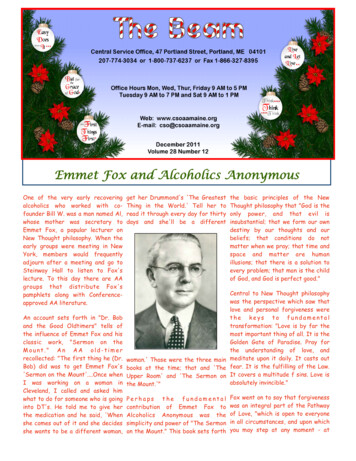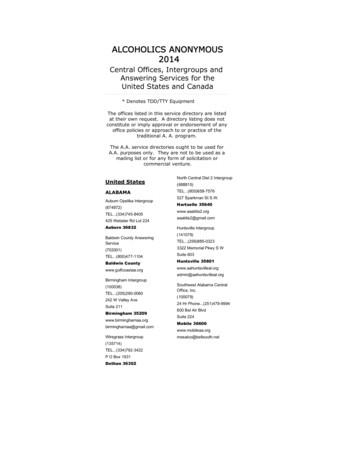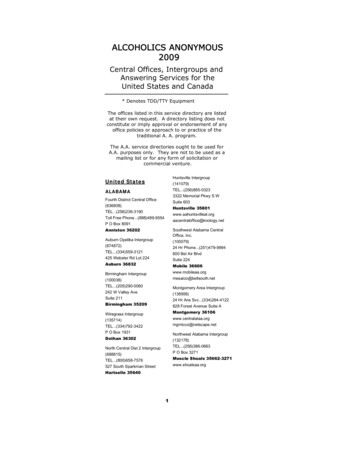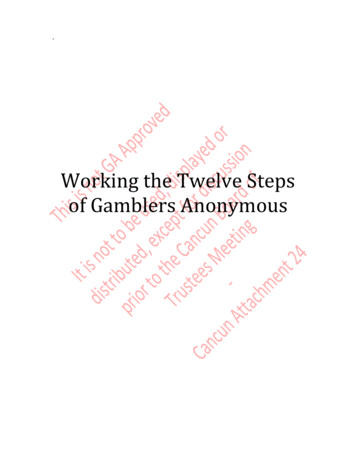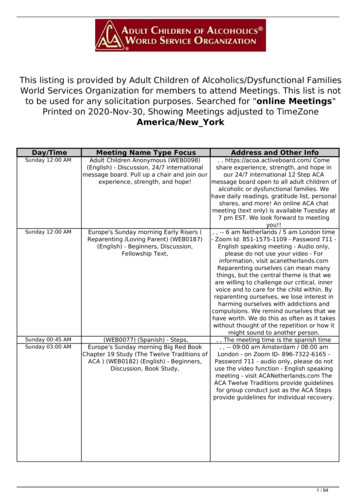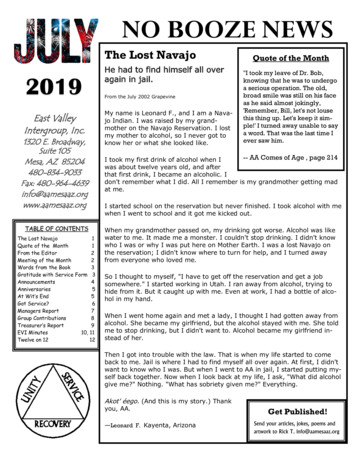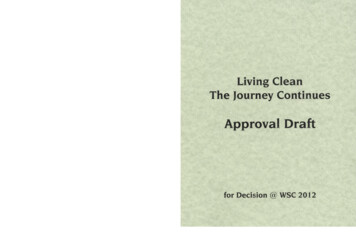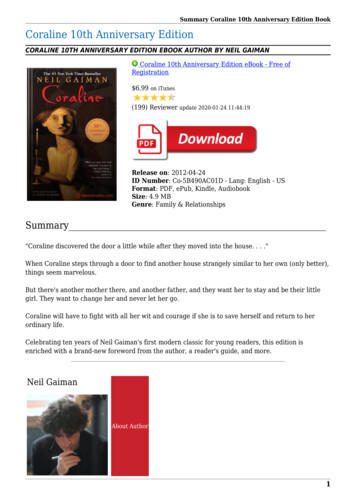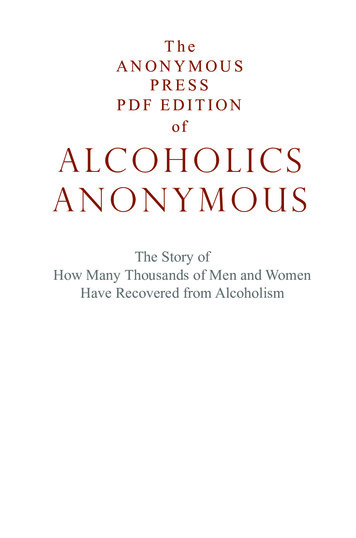
Transcription
TheANONYMOUSPRESSPDF EDITIONofALCOHOLICSANONYMOUSThe Story ofHow Many Thousands of Men and WomenHave Recovered from Alcoholism
STATEMENT OF PURPOSEThe Anonymous Press is made up of a bunch of A.A.members staying sober by carrying the message of A.A. Ourprimary purpose is to carry the message of A.A. by making ourbasic text affordable to all. Where we can, we also try to makethe text easier to study and understand.We realize that A.A., The Fellowship that saved our lives,is held together by The Traditions so The Traditions are whatguide us. All of our books are sold at cost. We have noemployees and we are certainly not organized.Our efforts have resulted in the distribution of ourfellowship’s basic text to tens of thousands of fellow alcoholicswho otherwise may not have had a book of their own. Detoxes,rehabs, prisons and shelters can now afford to give away ourtext - offering countless alcoholics a chance to learn theunadulterated message of our program.If you are a member of A.A. and would like to lend ahand to help in our work, volunteers and contributions arealways welcome.The Anonymous PressThe Anonymous Press is not affiliated with Alcoholics Anonymous World Services, Inc. or with the General Service Officeof Alcoholics Anonymous. The publication of this book hasnot been authorized or endorsed by, and does not imply affiliation with Alcoholics Anonymous World Services, Inc. or theGeneral Service Office of Alcoholics Anonymous.The Anonymous PressPO Box 1212Malo WA 99150-1212(800) 800-4398Fax (509)779-4339http://anonpress.org ap@anonpress.org
ABOUT THIS E-BOOKThis is a basic version of the text of Alcoholics Anonymous.This PDF version has been adapted from e-AA: a referenceto Alcoholics Anonymous by The Anonymous Press.Click here to find out more about the full version forWindows which includes this and a whole lot more.Apart from the web site, there is no technical support for thisversion.This is “7th Tradition” software which is means you candonate whatever you want for it - including nothing.To register/donate, please click here to visit:http://anonpress.org/pdfor write to:The Anonymous PressPO Box 1212Malo WA 99150Feel free to redistribute but please do not charge anything.Send e-mail to: pdf@anonpress.orge-mail addresses are kept strictly confidential.P D F Ve r s i o n O n e
ALCOHOLICSANONYMOUS
FOREWORDWE, OF Alcoholics Anonymous, are more than onehundred men and women who have recovered froma seemingly hopeless state of mind and body. To showother alcoholics precisely how we have recovered is themain purpose of this book. For them, we hope thesepages will prove so convincing that no further authentication will be necessary. We think this account of ourexperiences will help everyone to better understand thealcoholic. Many do not comprehend that the alcoholic isa very sick person. And besides, we are sure that ourway of living has its advantages for all.It is important that we remain anonymous because weare too few, at present to handle the overwhelming number of personal appeals which may result from this publication. Being mostly business or professional folk, wecould not well carry on our occupations in such an event.We would like it understood that our alcoholic work is anavocation.When writing or speaking publicly about alcoholism,we urge each of our Fellowship to omit his personal name,designating himself instead as “a member of AlcoholicsAnonymous.”Very earnestly we ask the press also, to observe thisrequest, for otherwise we shall be greatly handicapped.We are not an organization in the conventionalxiii
FOREWORDsense of the word. There are no fees or dues whatsoever.The only requirement for membership is an honest desireto stop drinking. We are not allied with any particularfaith, sect or denomination, nor do we oppose anyone.We simply wish to be helpful to those who are afflicted.We shall be interested to hear from those who are getting results from this book, particularly from those whohave commenced work with other alcoholics. We shouldlike to be helpful to such cases.Inquiry by scientific, medical, and religious societieswill be welcomed.Alcoholics Anonymous.
THE DOCTOR’S OPINIONWE OF Alcoholics Anonymous believe that thereader will be interested in the medical estimate ofthe plan of recovery described in this book. Convincingtestimony must surely come from medical men who havehad experience with the sufferings of our members andhave witnessed our return to health. A well-known doctor, chief physician at a nationally prominent hospitalspecializing in alcoholic and drug addiction, gave Alcoholics Anonymous this letter:To Whom It May Concern:I have specialized in the treatment of alcoholism formany years.In late 1934 I attended a patient who, though he hadbeen a competent businessman of good earning capacity, was an alcoholic of a type I had come to regard ashopeless.In the course of his third treatment he acquired certainideas concerning a possible means of recovery. As partof his rehabilitation he commenced to present his conceptions to other alcoholics, impressing upon them thatthey must do likewise with still others. This has becomethe basis of a rapidly growing fellowship of these menand their families. This man and over one hundred others appear to have recovered.I personally know scores of cases who were of the typewith whom other methods had failed completely.These facts appear to be of extreme medical importance; because of the extraordinary possibilities of rapidxviii
xxivTHE DOCTOR’S OPINIONgrowth inherent in this group they may mark a newepoch in the annals of alcoholism. These men may wellhave a remedy for thousands of such situations.You may rely absolutely on anything they say aboutthemselves.Very truly yours,William D. Silkworth, M.D.The physician who, at our request, gave us this letter,has been kind enough to enlarge upon his views in anotherstatement which follows. In this statement he confirmswhat we who have suffered alcoholic torture must believe—that the body of the alcoholic is quite as abnormalas his mind. It did not satisfy us to be told that we couldnot control our drinking just because we were maladjustedto life, that we were in full flight from reality, or wereoutright mental defectives. These things were true to someextent, in fact, to a considerable extent with some of us.But we are sure that our bodies were sickened as well. Inour belief, any picture of the alcoholic which leaves outthis physical factor is incomplete.The doctor’s theory that we have an allergy to alcoholinterests us. As laymen, our opinion as to its soundnessmay, of course, mean little. But as ex-problem drinkers,we can say that his explanation makes good sense. Itexplains many things for which we cannot otherwise account.Though we work out our solution on the spiritual aswell as an altruistic plane, we favor hospitalizationfor the alcoholic who is very jittery or befogged. Moreoften than not, it is imperative that a man’s brain becleared before he is approached, as he has then a bet-
THE DOCTOR’S OPINIONxxvter chance of understanding and accepting what we haveto offer.The doctor writes:The subject presented in this book seems to me to be ofparamount importance to those afflicted with alcoholicaddiction.I say this after many years’ experience as Medical Director of one of the oldest hospitals in the country treating alcoholic and drug addiction.There was, therefore, a sense of real satisfaction whenI was asked to contribute a few words on a subject whichis covered in such masterly detail in these pages.We doctors have realized for a long time that someform of moral psychology was of urgent importance toalcoholics, but its application presented difficulties beyond our conception. What with our ultra-modern standards, our scientific approach to everything, we are perhaps not well equipped to apply the powers of good thatlie outside our synthetic knowledge.Many years ago one of the leading contributors to thisbook came under our care in this hospital and while herehe acquired some ideas which he put into practical application at once.Later, he requested the privilege of being allowed to tellhis story to other patients here and with some misgiving,we consented. The cases we have followed through havebeen most interesting; in fact, many of them are amazing. The unselfishness of these men as we have come toknow them, the entire absence of profit motive, andtheir community spirit, is indeed inspiring to one whohas labored long and wearily in this alcoholic field. Theybelieve in themselves, and still more in the Power whichpulls chronic alcoholics back from the gates of death.Of course an alcoholic ought to be freed from his physical
xxviTHE DOCTOR’S OPINIONcraving for liquor, and this often requires a definite hospital procedure, before psychological measures can be ofmaximum benefit.We believe, and so suggested a few years ago, that theaction of alcohol on these chronic alcoholics is a manifestation of an allergy; that the phenomenon of cravingis limited to this class and never occurs in the averagetemperate drinker. These allergic types can never safelyuse alcohol in any form at all; and once having formedthe habit and found they cannot break it, once havinglost their self-confidence, their reliance upon things human, their problems pile up on them and become astonishingly difficult to solve.Frothy emotional appeal seldom suffices. The message which can interest and hold these alcoholic peoplemust have depth and weight. In nearly all cases, theirideals must be grounded in a power greater than themselves, if they are to re-create their lives.If any feel that as psychiatrists directing a hospital foralcoholics we appear somewhat sentimental, let them standwith us a while on the firing line, see the tragedies, thedespairing wives, the little children; let the solving of theseproblems become a part of their daily work, and even oftheir sleeping moments, and the most cynical will not wonder that we have accepted and encouraged this movement.We feel, after many years of experience, that we havefound nothing which has contributed more to the rehabilitation of these men than the altruistic movement nowgrowing up among them.Men and women drink essentially because they like theeffect produced by alcohol. The sensation is so elusive that,while they admit it is injurious, they cannot after a timedifferentiate the true from the false. To them, their alcoholic life seems the only normal one. They are restless,irritable and discontented, unless they can again experience
THE DOCTOR’S OPINIONxxviithe sense of ease and comfort which comes at once bytaking a few drinks—drinks which they see others takingwith impunity. After they have succumbed to the desireagain, as so many do, and the phenomenon of cravingdevelops, they pass through the well-known stages of aspree, emerging remorseful, with a firm resolution not todrink again. This is repeated over and over, and unlessthis person can experience an entire psychic change thereis very little hope of his recovery.On the other hand—and strange as this may seem tothose who do not understand—once a psychic change hasoccurred, the very same person who seemed doomed, whohad so many problems he despaired of ever solving them,suddenly finds himself easily able to control his desire foralcohol, the only effort necessary being that required tofollow a few simple rules.Men have cried out to me in sincere and despairing appeal:“Doctor, I cannot go on like this! I have everything to livefor! I must stop, but I cannot! You must help me!”Faced with this problem, if a doctor is honest withhimself, he must sometimes feel his own inadequacy. Although he gives all that is in him, it often is not enough.One feels that something more than human power isneeded to produce the essential psychic change. Thoughthe aggregate of recoveries resulting from psychiatriceffort is considerable, we physicians must admit we havemade little impression upon the problem as a whole.Many types do not respond to the ordinary psychological approach.I do not hold with those who believe that alcoholism isentirely a problem of mental control. I have had manymen who had, for example, worked a period of months onsome problem or business deal which was to be settled on acertain date, favorably to them. They took a drink a day orso prior to the date, and then the phenomenon of cravingat once became paramount to all other interests so that the
xxviiiTHE DOCTOR’S OPINIONimportant appointment was not met. These men werenot drinking to escape; they were drinking to overcomea craving beyond their mental control.There are many situations which arise out of the phenomenon of craving which cause men to make the supreme sacrifice rather than continue to fight.The classification of alcoholics seems most difficult,and in much detail is outside the scope of this book. Thereare, of course, the psychopaths who are emotionally unstable. We are all familiar with this type. They are always“going on the wagon for keeps.” They are over-remorseful and make many resolutions, but never a decision.There is the type of man who is unwilling to admit that hecannot take a drink. He plans various ways of drinking. Hechanges his brand or his environment. There is the typewho always believes that after being entirely free from alcohol for a period of time he can take a drink withoutdanger. There is the manic-depressive type, who is, perhaps, the least understood by his friends, and about whom awhole chapter could be written.Then there are types entirely normal in every respectexcept in the effect alcohol has upon them. They are oftenable, intelligent, friendly people.All these, and many others, have one symptom in common: they cannot start drinking without developing thephenomenon of craving. This phenomenon, as we havesuggested, may be the manifestation of an allergy whichdifferentiates these people, and sets the
book came under our care in this hospital and while here he acquired some ideas which he put into practical appli-cation at once. Later, he requested the privilege of being allowed to tell his story to other patients here and with some misgiving, we consented. The cases we have followed through have been most interesting; in fact, many of them are amaz-ing. The unselfishness of these men as we .
